We all want lustrous, healthy-looking hair, no matter if you prefer curly, wavy, or straight locks. But when your hair looks and feels like straw even though you’ve taken good care of it, what gives?
There are multiple factors that can cause dry hair beyond the usual suspects – like environmental, genetic, or health issues. Let’s cut to the chase and go over the various reasons you might have drier hair than you’d like.
Weather and Environment

Let’s start with one of the most common reasons that can cause dry hair.
The weather!
We all know how tropical, hot, humid, soupy conditions can make hair frizz. But did you know that winter’s cold temperatures and even your air conditioner can all dry your hair out?
Cold air and air-conditioned environments naturally hold less moisture than warm air, which dehydrates hair.
As a result, hair can start to lose its natural sheen and be susceptible to snapping and breakage.
High winds are also hazardous to long hair, even without extreme temperatures. Windy days strip the natural moisture away from your scalp and can worsen split ends, especially if strands have been whipped around in the wind.
Don’t forget that summer days soaking in the rays or splashing around in the ocean or pool is also quite drying to both your skin and hair.
Chlorine – a chemical used to disinfect and kill bacteria – strips skin and hair of moisture, as does salt water if you’re not careful. This is because salt water leaches water out of hair and skin the way pickling a cucumber dehydrates the cucumber.
Even UV rays are damaging to your hair if you spend long days out in the sun.
To protect hair, wear a hat or scarf around your head when you’ll be exposed to the sun for long hours, and be sure to rinse hair with fresh water after being submerged in the ocean or pool.
Too Much Heat Styling
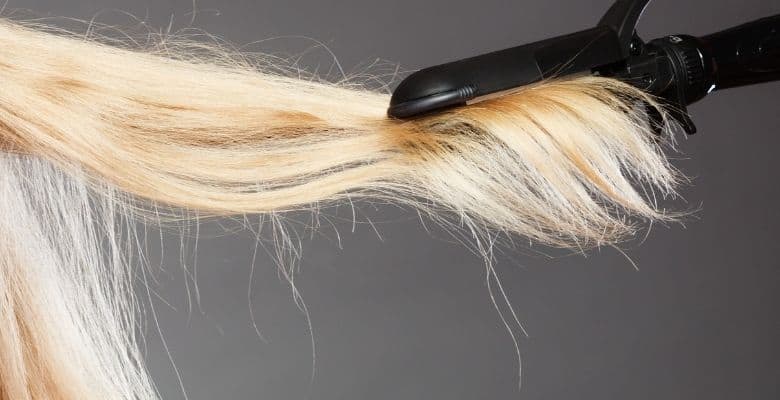
Using heat to style your hair is one of the easiest ways to get a new look, whether you’re using a straightener or a curling iron.
However, it’s also one of the quickest ways to dry out and damage your hair if you’re doing so excessively.
Here are some signs that you might be overdoing the heat:
- A noticeably rough texture when running your fingers through your hair
- Highly fragile split ends that break off with minor pressure
- Sections that are thinner midstrand
- Noticeable tangling and knots
If you do use a curling or flat iron to style your hair, be mindful of the plate or barrel material used. Metals such as chrome, stainless steel and even titanium can strip hair of moisture because of the high heat these materials conduct.
Ceramic is generally safer and less damaging to all hair types as it generates uniform, even heat at lower intensities.
Tuning down the frequency of heat styling – including using a hair dryer on high – will lower the amount of heat your strands are exposed to on a daily basis.
Lastly, always be sure to use a heat protectant to coat and protect your hair from high temperatures.
Chemical Treatments (Dyes, Perms, Bleaching, or Relaxing)
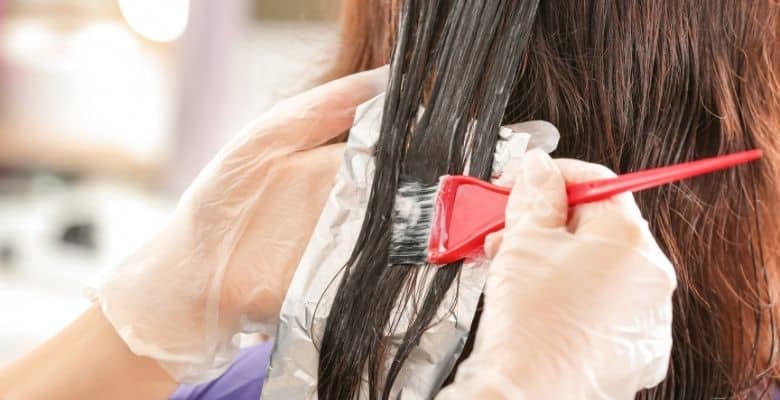
If there’s one surefire way to dry your hair out, it’s by applying chemical treatments to change the natural texture or color of your tresses.
Coloring, relaxing or perming treatments all use harsh chemicals to break down the bonds in the cuticle layer in order to access the cortex layer.
Since these chemicals are required to penetrate deep into the hair shaft, an open cuticle layer leaves the inner cortex exposed and vulnerable.
This is why top hair professionals around the world recommend rehydrating hair immediately after treating your hair chemically. Natural moisturizing oils, such as argan and jojoba oils are often used to reconstitute extra dry hair.
Hard Water
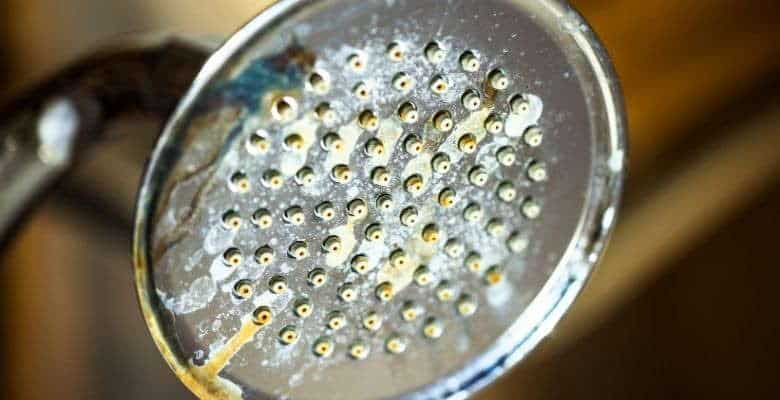
One of the most overlooked factors that can cause dry hair is hard water. Hard water is found in various regions, and refers to water with high mineral content.
Although this doesn’t sound like a bad thing since hard water can generally be safe to drink, it can cause some serious damage to your hair.
According to a 2016 study analyzing the effects of hard water on hair samples, dry scalp and hair follicles are directly associated with an increased level of minerals in the water when compared to distilled or deionized water.
The study involved various hair samples from 15 healthy women that washed in hard water and distilled water for 30 days to study the impacts.
By the end of the study, the strands that were washed in hard hair showed a noticeable level of dryness as well as thinning and breaking of the hair filaments, dullness, frizz, and tangles.
In fact, another study that involved using hard water on a real scalp and not just hair samples also showed signs of overly stressed hair and dry scalp, which bring along a whole slew of issues like hair loss and dandruff.
So how can you avoid washing your hair in hard water if you live in a hard water region? One way is by installing a water softening shower head to remove chlorine, fluoride, and other minerals from your tap water.
Harsh Ingredients in Your Shampoo
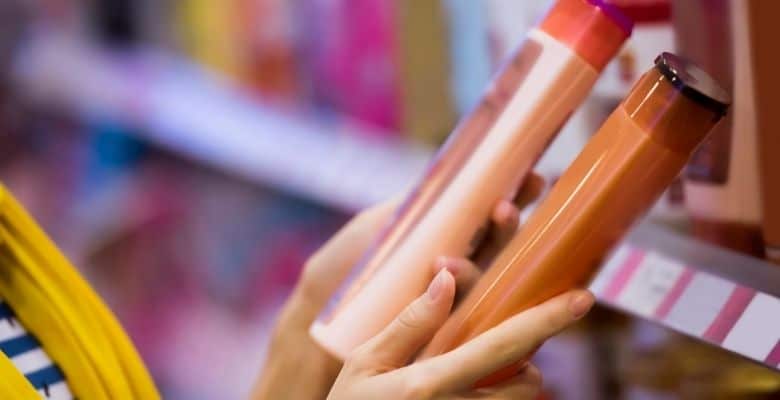
Regular shampoos often contain a variety of ingredients that can strip the moisture out of your hair and leave it brittle, dull, and dry.
You see, that foamy lather you generate when shampooing is great for removing dirt and oil, but it’s also very drying to your strands and scalp.
Lather is generated by sulfates like sodium lauryl sulfate or sodium laureth sulfate, which separate water molecules from oil to degrease and clean your strands.
It’s so drying that there are several sulfate-free shampoos available, which is generally recommended if you have dry hair.
You can also end up with overly dry hair if you use a clarifying shampoo, which should only be used occasionally when you’ve got extra build up or residue from hair product or hard water. So be sure to use one sparingly and not as your regular shampoo.
A good hydrating shampoo like the Moroccan Argan Oil Shampoo and Conditioner is excellent for dry hair.
Also, don’t wash your hair too often if it’s very dry and always make sure to condition well after shampooing.
Medications You’re Taking or Hormonal Imbalance

Hair quality isn’t only affected by external factors. It’s also affected by your hormones, either naturally occurring or as a side effect from medications or drugs.
Menopause and stress, for example, are often associated with hair loss while pregnancy is known to increase the growth of unwanted hair on other regions of the body.
Other conditions like hypothyroidism are often linked with dry and brittle hair as well as an itchy scalp, among other symptoms.
Conversely, if you suffer from an overactive thyroid, medications used to decrease the activity of the thyroid gland can also make hair dry as a side effect.
Medications used to treat depression, blood pressure, cholesterol, and oral contraceptives have all been known to thin out hair or cause brittleness. Aside from that, prescription drugs can also affect how well hair takes to styling too, making it more difficult to color, straighten, or curl.
Additionally, your diet and overall health greatly affects the health of your hair. If you don’t get enough nutrients or suffer from an eating disorder like anorexia, your hair can be thin, dry, and fragile.
A balanced and healthy diet with plenty of protein (whether animal or plant-based) is necessary for hair growth and health.
Dry Scalp
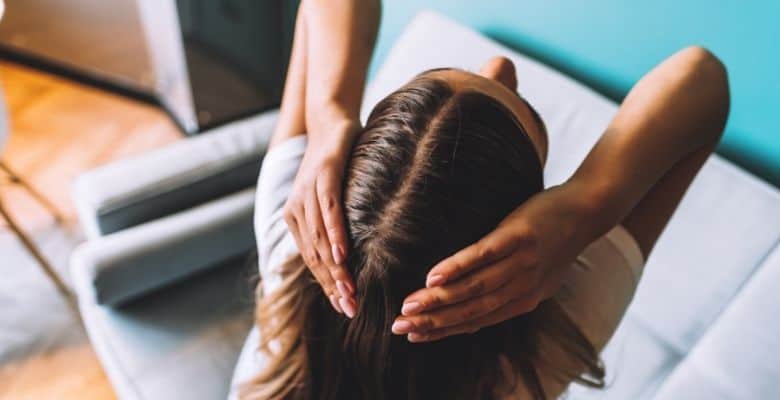
Dry scalp equals dry hair, no matter how healthy the hair shaft is. Since sebum, or skin’s natural oil, keeps both skin and hair hydrated and moisturized, your scalp provides the oil necessary for shine and pliability of each strand.
If you have dry skin in general, you’ll likely have dry scalp too. You can use a moisturizing shampoo or apply essential oils like tea tree oil or jojoba oil to help hydrate your scalp.
Some skin conditions, medications, and environmental problems will cause dryness on your head, contributing to dry hair.
If you experience eczema, redness or excessive itching of your scalp, be sure to consult with a dermatologist or a trichologist to see what the underlying issue might be.
Age
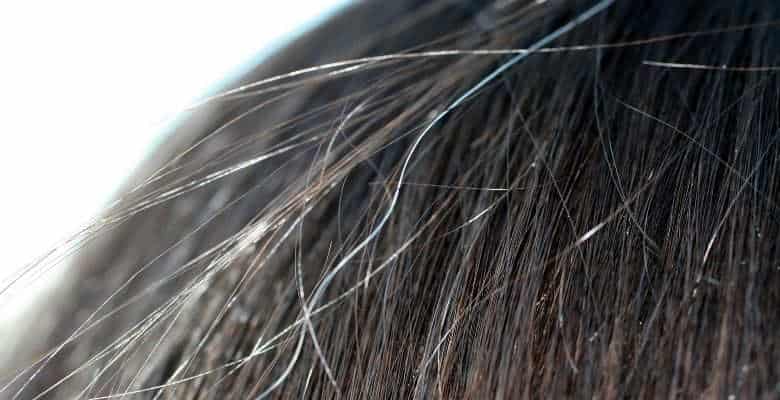
One of the first signs of aging is the presence of gray hair by the age of 30 or 40. However, grays are not the only sign of aging that your hair will show.
It might also look and feel drier and brittler than before.
You see, sebaceous glands in our skin produce sebum, a waxy substance that moisturizes and protects your skin. This is your skin’s natural oil, which travels from your scalp down the length of your strands when you brush or comb your hair, coating it from root to tip.
As we get older, these oil glands start to shrink gradually, leaving both skin and hair less moisturized and more prone to breakage.
The easiest solution is to simply apply natural oils directly, such as argan, coconut, and jojoba oil. This helps coat each strand the way sebum would when your skin used to produce more of it.
It’s also best to use milder shampoos and conditioners that won’t aggressively strip hair of its natural oils. Washing your hair less often is also helpful.
Dry Hair, Be Gone!
Now that you know some of the reasons why you might not have the shiny, healthy hair you’re dreaming of, keep in mind that it can also be a combination of factors.
If you stop coloring your hair but still use harsh shampoos or live in a hard water area, you may not get the soft, luxurious locks you want. Likewise, only using mild shampoos and regularly slathering on deep conditioners won’t do much if your diet is missing important nutrients for nourishing your scalp and growing healthy hair.
Taking steps to help keep your locks moisturized doesn’t have to be hard though, and many solutions are within your control. Try to adjust one thing at a time to see which culprit is the main factor for you. With time and consistent care, you should start to see and feel healthier, shinier hair.